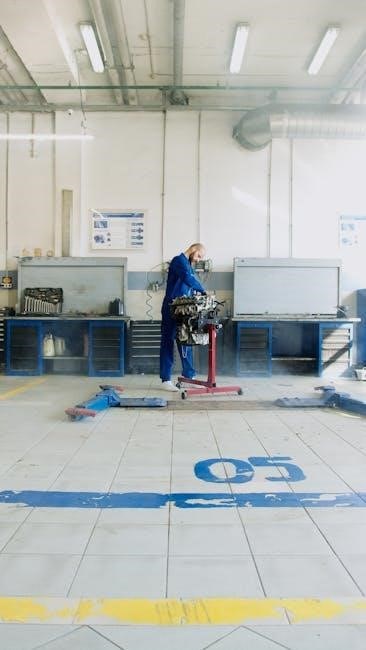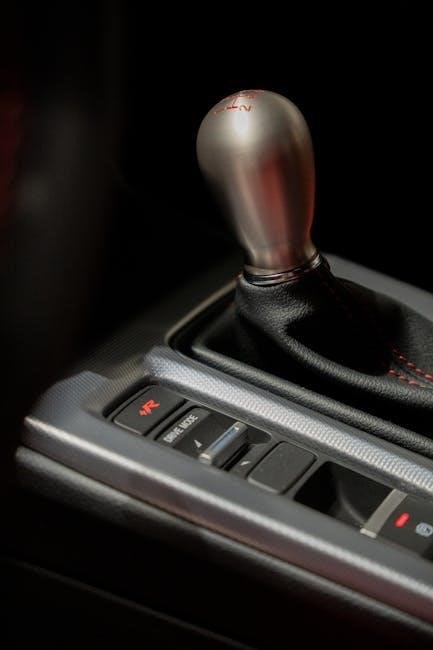diesel cars with manual transmission

Diesel cars with manual transmission offer a unique blend of fuel efficiency‚ performance‚ and driver control‚ making them a popular choice for both daily commuting and long hauls.
1.1 Overview of Diesel Engines and Manual Transmissions
Diesel engines are known for their fuel efficiency and torque‚ making them ideal for manual transmissions. Manual transmissions offer precise control over gear shifts‚ enhancing performance and driver engagement. This combination is popular for its reliability and cost-effectiveness‚ appealing to both everyday drivers and those needing heavy-duty capabilities.
1.2 Importance of Manual Transmissions in Diesel Vehicles
Manual transmissions in diesel vehicles are valued for their fuel efficiency‚ lower costs‚ and driver control. They maximize the diesel engine’s torque‚ improving performance and towing capacity. Additionally‚ manuals often require less maintenance than automatics‚ making them a practical choice for long-term reliability and cost savings‚ especially for drivers seeking a more engaged and economical driving experience.
History and Evolution of Diesel Cars with Manual Transmission
Diesel cars with manual transmissions trace their origins to the early 20th century‚ evolving from heavy-duty trucks to become efficient‚ durable vehicles for both work and daily use.
2.1 Early Development of Diesel Engines
The diesel engine was invented by Rudolf Diesel in 1893‚ initially for stationary use. Its high efficiency and torque soon led to adoption in trucks and‚ later‚ passenger vehicles‚ pairing well with manual transmissions for precise control and optimal performance‚ especially in heavy-duty applications where reliability and fuel economy were paramount over the years.
Manual transmissions were first paired with diesel engines in the mid-20th century‚ offering precise control and enhanced fuel efficiency. This combination became popular in European markets‚ where diesel engines were widely adopted for their economy. The manual transmission’s ability to optimize diesel engines’ torque made it a preferred choice for both commercial and passenger vehicles‚ ensuring longevity and performance.

Benefits of Diesel Cars with Manual Transmission
Diesel cars with manual transmission offer superior fuel efficiency‚ lower emissions‚ and enhanced engine durability‚ making them a cost-effective and environmentally friendly choice for drivers seeking longevity.
3;1 Fuel Efficiency and Performance
Diesel engines paired with manual transmissions deliver exceptional fuel efficiency due to their high torque output and optimal gear control. This combination enhances performance‚ especially in hauling heavy loads or driving uphill‚ while maintaining lower fuel consumption compared to automatic counterparts. The driver’s ability to manually adjust gears ensures precise power delivery‚ improving overall driving dynamics and mileage efficiency.
3.2 Cost-Effectiveness and Longevity
Diesel cars with manual transmissions are renowned for their cost-effectiveness and durability. Lower fuel costs and reduced wear on engine components contribute to long-term savings. Manual transmissions are generally more reliable and require less maintenance than automatics‚ reducing repair expenses. With proper care‚ diesel engines can last significantly longer‚ making them a practical choice for drivers seeking a durable and economical vehicle option over time.
Reliability and Durability of Diesel Engines
Diesel engines are built to last longer‚ with robust construction and ability to withstand heavy use. Regular maintenance further enhances their lifespan‚ ensuring reliability over time.
4.1 Factors Contributing to Reliability
Diesel engines’ reliability stems from their robust design and build quality. The absence of spark plugs reduces wear‚ while manual transmissions‚ known for simplicity‚ enhance durability. Proper maintenance‚ including regular oil changes and filter replacements‚ ensures longevity. Additionally‚ diesel engines often have longer service intervals‚ contributing to their reputation for dependability over time‚ especially under consistent‚ well-maintained conditions.
4.2 Maintenance Practices for Longevity
Regular maintenance is crucial for extending the life of diesel cars with manual transmissions. This includes frequent oil and filter changes‚ cleaning fuel injectors‚ and inspecting the clutch and gearbox for wear. Monitoring coolant and diesel exhaust fluid levels ensures optimal engine performance. Adhering to a consistent maintenance schedule and addressing issues promptly helps prevent costly repairs and maintains the vehicle’s reliability over time.
Driving Techniques for Diesel Cars with Manual Transmission
Mastering smooth acceleration‚ proper gear shifting‚ and maintaining control are essential skills for driving diesel cars with manual transmissions‚ ensuring optimal performance and fuel efficiency.
5.1 Mastering the Art of Shifting Gears
Shifting gears in a diesel manual car requires precise timing and coordination. Start by pressing the clutch fully‚ moving through gears smoothly with the stick. Pay attention to engine RPMs‚ shifting up when RPMs rise and down when slowing. Practice makes perfect‚ ensuring seamless transitions and optimal fuel efficiency. Consistency is key to mastering this skill.
5.2 Optimizing Fuel Efficiency While Driving
Optimizing fuel efficiency in diesel manual cars involves smooth acceleration‚ maintaining steady speeds‚ and avoiding aggressive driving. Shift gears at appropriate RPMs to reduce strain on the engine. Use higher gears on inclines and lower gears for better control downhill. Regular maintenance‚ proper tyre pressure‚ and minimizing idling also contribute to maximizing fuel economy and overall efficiency.
Environmental Impact of Diesel Cars
Diesel cars emit pollutants like nitrogen oxides and particulate matter‚ contributing to air pollution. Tyre and brake wear release microplastics‚ impacting the environment significantly.
6.1 Emissions and Pollution Concerns
Diesel cars with manual transmission emit significant pollutants‚ including nitrogen oxides and particulate matter‚ which contribute to air quality degradation and health issues. Additionally‚ tyre and brake wear release microplastics‚ further harming the environment. These emissions highlight the need for stricter regulations and cleaner technologies to mitigate diesel vehicles’ ecological footprint.
6.2 Modern Solutions for Reducing Environmental Impact
Modern advancements aim to minimize diesel cars’ environmental impact through improved engine designs‚ emission filters‚ and cleaner fuels. Technologies like selective catalytic reduction and particulate filters significantly reduce pollutants. Additionally‚ hybrid systems and synthetic fuels offer pathways to sustainability‚ aligning diesel engines with stricter emission standards while maintaining their efficiency and performance benefits.

Modern Advancements in Diesel Manual Transmission Technology
Advancements include improved turbocharger efficiency‚ enhanced fuel injection systems‚ and lightweight materials‚ optimizing performance and reducing emissions while maintaining the classic appeal of manual transmissions.
7.1 Improvements in Engine Design
Modern diesel engines feature advanced turbocharging‚ common-rail fuel injection‚ and lightweight materials‚ enhancing power delivery and fuel efficiency. These designs reduce emissions while maintaining the durability and responsiveness that manual transmissions require‚ creating a seamless integration between engine performance and driver control for a more efficient and enjoyable driving experience.
7.2 Integration of Advanced Transmission Systems
Advanced manual transmissions now incorporate features like dual-clutch technology and optimized gear ratios‚ improving shifting precision and responsiveness. These systems reduce driver fatigue while enhancing acceleration and fuel economy‚ ensuring smooth operation even in demanding conditions. The integration of electronic controls further refines performance‚ making modern manual transmissions a perfect match for powerful diesel engines.
Comparison with Automatic Transmission Diesel Cars
Diesel cars with manual transmission offer better fuel efficiency and control compared to automatics‚ while automatics provide ease of use and reduced driver effort in traffic conditions.
8.1 Performance Differences
Manual transmissions in diesel cars often deliver quicker acceleration and precise control‚ allowing drivers to optimize engine torque. Automatics‚ however‚ provide smoother acceleration and reduced driver effort‚ making them more suitable for urban driving. The choice between the two largely depends on driving habits and preferences‚ with manuals exceling in performance and automatics in convenience.
8.2 Practicality and Driver Preference
Diesel cars with manual transmission are favored for their fuel efficiency and lower maintenance costs‚ appealing to budget-conscious drivers. However‚ they require more skill and effort‚ especially in heavy traffic. Automatic transmissions‚ while less engaging‚ offer greater convenience and ease of use‚ making them preferable for urban commuting. Driver preference often hinges on lifestyle and driving conditions.
Maintenance and Repair Tips
Regular oil changes‚ transmission fluid checks‚ and filter replacements are crucial for diesel cars with manual transmission. Monitoring engine performance and addressing issues early ensures longevity and efficiency.
9.1 Regular Maintenance Schedule
Regular maintenance for diesel cars with manual transmission includes oil changes every 5‚000-7‚500 miles‚ transmission fluid checks‚ and filter replacements. Ensure coolant‚ belts‚ and battery health are monitored. Adhere to the manufacturer’s schedule to prevent breakdowns and optimize performance. Consistent upkeep extends longevity and ensures reliability‚ making it a critical part of owning a diesel manual vehicle.
9.2 Common Issues and Troubleshooting
Common issues in diesel manual cars include faulty fuel injectors‚ turbocharger failures‚ and transmission clutch wear. Troubleshooting involves scanning for fault codes with an OBD2 tool and checking for low fuel pressure. Regular filter replacements and monitoring exhaust gas temperatures can prevent these issues. Addressing problems early ensures smooth operation and prevents costly repairs‚ enhancing overall vehicle reliability and performance.

Popular Models of Diesel Cars with Manual Transmission
Popular models include the Volkswagen Golf TDI‚ BMW 3 Series diesel‚ Ford Focus TDCi‚ and Peugeot 308 HDi‚ known for their fuel efficiency and performance.
10.1 Compact and Mid-Size Vehicles
Compact and mid-size diesel cars with manual transmission are ideal for urban and highway driving. Models like the Volkswagen Golf TDI‚ BMW 3 Series diesel‚ and Ford Focus TDCi offer excellent fuel efficiency‚ responsive performance‚ and lower emissions. These vehicles are popular for their balance of affordability‚ reliability‚ and driving pleasure‚ making them a practical choice for everyday use and long-distance travel.
10.2 Luxury and High-Performance Models
Luxury and high-performance diesel cars with manual transmission combine opulence with power. Models like the Audi A6 TDI‚ Jaguar XE D180‚ and BMW 5 Series diesel offer refined interiors‚ advanced tech‚ and robust engines. These vehicles cater to discerning drivers seeking both comfort and exhilarating performance‚ making them a premium choice for those who value luxury and driving dynamics in a diesel-powered manual transmission setup.
Buying Guide for Diesel Cars with Manual Transmission
When purchasing a diesel car with manual transmission‚ assess your needs‚ budget‚ and usage. Research reliability‚ fuel efficiency‚ and maintenance costs. Test drive models to ensure compatibility and satisfaction‚ focusing on performance and comfort for your specific requirements.
11.1 Factors to Consider When Purchasing
When buying a diesel car with manual transmission‚ consider fuel efficiency‚ engine performance‚ and maintenance costs. Assess your budget‚ usage patterns‚ and required features. Check the vehicle’s reliability‚ brand reputation‚ and resale value. Inspect the car’s mileage‚ service history‚ and condition. Test drive to ensure smooth gear shifting and overall comfort. Prioritize models with proven durability and lower ownership costs for long-term satisfaction.
11.2 Test Driving and Inspection Tips
During a test drive‚ assess the smoothness of gear shifts and clutch response. Check for unusual engine noises or vibrations. Inspect the vehicle’s exterior and interior for wear and tear. Review maintenance records to ensure proper servicing. Look for signs of leaks or damage under the hood. Ensure all features function correctly. A thorough inspection helps identify potential issues and ensures a reliable purchase decision for your diesel manual car.

Future Prospects of Diesel Manual Transmission Cars
Diesel manual cars face competition from electric vehicles but may thrive through technological advancements‚ offering improved efficiency and sustainability for enthusiasts who value driving dynamics and control.
12.1 Impact of Electric Vehicles on Diesel Cars
The rise of electric vehicles (EVs) poses significant competition to diesel cars‚ particularly manual transmission models. As EVs gain popularity due to environmental concerns and technological advancements‚ diesel car sales may decline. Stricter emissions regulations and shifting consumer preferences toward eco-friendly options further threaten the dominance of diesel engines. However‚ diesel cars with manual transmissions may still find a niche in specific markets where their unique benefits remain valued.
12.2 Potential Innovations in Diesel Technology
Future innovations in diesel technology may focus on enhancing efficiency and reducing emissions‚ such as advanced turbocharging systems and cleaner combustion methods. Researchers are also exploring synthetic diesel fuels and hybridization‚ which could complement manual transmissions by optimizing performance and fuel economy. These advancements aim to keep diesel cars relevant in a rapidly evolving automotive landscape.
Diesel cars with manual transmission remain a top choice for drivers seeking fuel efficiency‚ performance‚ and control‚ offering a timeless driving experience that continues to appeal globally.
13.1 Summary of Key Points
Diesel cars with manual transmission offer exceptional fuel efficiency‚ durability‚ and driver control. They are cost-effective‚ reliable‚ and suitable for both city and long-distance driving. Regular maintenance ensures longevity‚ while modern advancements improve performance and reduce emissions. Despite rising competition from automatics and EVs‚ these vehicles remain a preferred choice for many drivers seeking a blend of power and practicality.
13.2 Final Thoughts on Diesel Cars with Manual Transmission
Diesel cars with manual transmission remain a viable option for drivers seeking fuel efficiency‚ durability‚ and control. While they require more skill and maintenance‚ their longevity and cost-effectiveness make them appealing. Despite the rise of automatics and EVs‚ these vehicles retain a loyal following‚ offering a unique driving experience that balances performance with practicality for both enthusiasts and pragmatic users alike.



Leave a Reply
You must be logged in to post a comment.